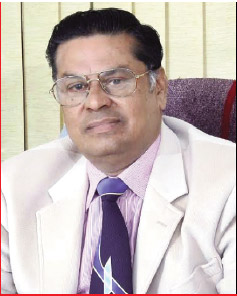
 |
Higher Education
Outdated syllabi, poor research tools !M. R. Dua
Yesterday's educational system
will not meet today's, even less
so, the needs of tomorrow, said
Professor Daulat Singh Kothari,
chairman of the 1964 Education
Commission, while presenting
his report to the Union government over
half a century ago. Kothari's prophetic
observations sound true even now.
India's educational system doesn't
compare favourably with global standards. What's wrong with our educational system, and why are these youngsters with hi-fi degrees found wanting to meet the employers' needs? Well,they have honed their knowledge skills on outdated syllabi; they are bereft of essential skills required by today's mostly ejob or i-job positions. Also, majority of the pedagogic infrastructure and supporting paraphernalia – labs, libraries, industrial workshops, tools, techniques and devices - are either unworkable or worn out and are Strict financial audit is equally necessary to check scams since there are reports of fund misuse at universities like AMU, Allahabad, Puducherry, and Garhwal. Similarly, academic vigil should enforce rejections, dismissals, and denials of promotions to undeserving faculty. Such steps would go a long way in encouraging and rewarding genuine and original research and innovation. rarely comparable to international
standards.
In the days of yore,classroom syllabi
mostly spanned imparting instructions in
essential axioms of morality, ethics and
philosophy, ancient heritage and culture.
No more. with poor grades in the qualifying examination are admitted for hefty monetary considerations. No surprise, many of these one-time money making machines are forced to pull down their shutters. Already some 300 engineering colleges have been ordered to shut shop; another 500 others are under HRD ministry's scanner.
There will be need for a workforce of 3.3 billion by 2020, increasingly in the services and capital-intensive manufacturing sectors… 90 per cent of GDP and 75 per cent of employment will be in these sectors. What India should do?
Multiple national and international
educational testing and assessment
agencies have pinpointed what's wrong
with our educational model. These
reports are simply crying for attention.
We must discard the flawed academic
streams. Bid good-bye to teaching shops.
And reform teaching and training
practices and update the curriculum on a
continuous basis by borrowing ideas
from centres of learning at Berkeley,
Stanford, London, Cambridge, Harvard,
Ottawa and Singapore. It is highly imperative for the powers that be to chalk out vibrant and a multi-faceted education model to fashion the nation's path to meet the demands of the millennium, as the world throws up newer, innovative tasks. Eminent educational administrator N. Sundararajan has sounded a warning. "The existing challenges for Indian education – access, equity and quality—will only be greatly exacerbated by 2030 unless we significantly transform our education model", he said . As technologies play dominant role in all branches of knowledge and education, it should be actively yoked in academic and research pursuits. The education sector demands adequate investment at all levels to ensure a better deal to our students. Not drastic cuts in allocation as was the case in the Union Budget for the 2017-18 fiscal. Newly started IITs, IIITs, IIMs, and other centres of excellence need to be generously funded in order to ensure high quality research. There should be at least 6 per cent provision in the Union Budget year after year for some time to come. Unless this is done, gaping holes in higher education and research will stay put. Strict financial audit is equally necessary
to check scams since there are reports of
fund misuse at universities like AMU,
Allahabad, Puducherry, and Garhwal.
Similarly, academic vigil should enforce
rejections, dismissals, and denials of
promotions to undeserving faculty. Such
steps would go a long way in encouraging
and rewarding genuine and original
research and innovation. Connected with various education institutes in India and the US, the author is a former professor of the Indian Institute of Mass Communication, New Delhi. |
|



 N. Sundararajan
N. Sundararajan